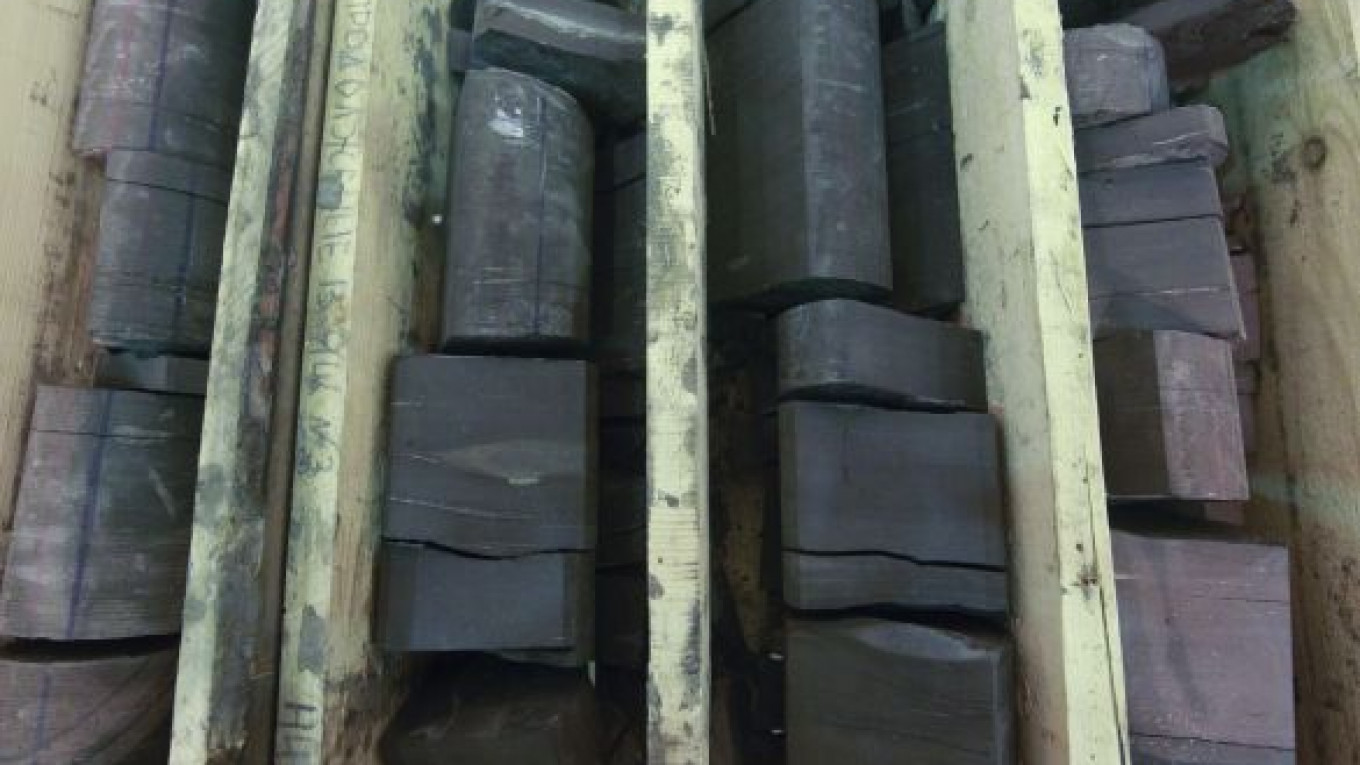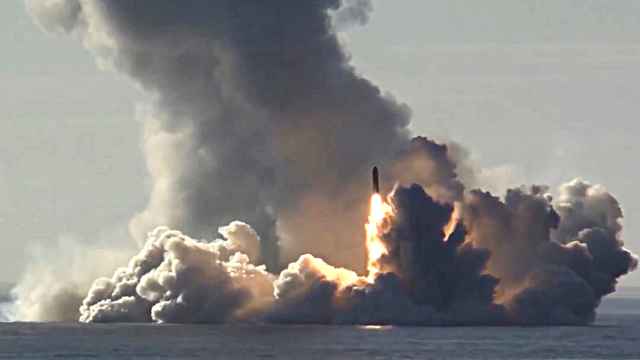Russia introduced tax breaks on production of hard-to-recover "tight" oil Sunday, but the giveaway alone will not be enough just yet for the world's largest oil-producing nation to replicate the North American shale energy revolution.
Incentives of as much as $21 per barrel will transform the economics of exploration, encouraging the use of advanced drilling methods to pulverize, or "frack", vast tracts of nonporous rock into yielding up their hydrocarbon riches.
Rosneft, the state oil major that lobbied for and won the concessions, will lead the drive to tap Siberia's vast Bazhenov Formation with ExxonMobil, the U.S. supermajor that enjoys most favor in Vladimir Putin's Kremlin.
But whereas savvy, independent oil firms spearheaded the U.S. shale boom, Russia lacks its own wildcatters. Their ranks have been thinned by the departure of two bosses from London-listed RusPetro who had pioneered the use of fracking in Siberia at now-defunct major Yukos.
"This regime will not be a catalyst for big growth in the oil sector in 2014-2015 but it may change the sector's configuration over a five-year timeframe," said Alexei Kokin, an energy industry analyst at UralSib, a Moscow brokerage.
Russia pumps more than 10 million barrels per day (bpd) but faces a challenge to sustain these levels as fields in its oil heartland of western Siberia have become increasingly depleted, while no major discoveries have been made since the Soviet era.
Yet western Siberia still holds vast potential thanks to its untapped tight oil reserves, the largest being the Bazhenov Formation that extends across 2.3 million square kilometers (890,000 square miles).
Zero Rated
Under the new regime, Russia will apply a zero rate of mineral extraction tax (MET) to Bazhenov and another Siberian play called Abalak, to Khadum in southern Russia and to Domanik in the Volga-Urals region.
Some other tight oil reserves will attract relief of between 20 and 80 percent on the standard rate of MET, which is based on a complex formula but currently diverts around a fifth of the sale price of an export barrel into state coffers.
The key point, experts say, is that the Russian state collects most of each incremental dollar on a barrel of oil that is exported above a certain price. That cutoff price will rise as a result of the tight oil breaks, ensuring that the incentive works even if oil prices decline from their current high levels.
With oil at $100 a barrel, the saving will be around $4.20 per barrel for the most easily accessible formations and $21 a barrel for more complicated reserves, said Grigory Vygon, Energy Center director at Moscow's Skolkovo School of Management.
Estimates of Bazhenov's potential vary hugely, with the Ministry of Natural Resources putting a figure of 3.7 billion barrels on its recoverable reserves — or one year's Russian oil production.
The U.S. Energy Information Administration estimates that Russian recoverable shale oil reserves stand at 75 billion barrels, more than the 58 billion barrels held by the United States, which is now the leader in shale oil production.
"This is just the tip of the iceberg in Russia," Emily Stromquist, an energy analyst at the consultancy Eurasia Group, wrote in a note referring to the official Russian estimate.
Long Way to Go
Soviet geologists first extracted oil from Bazhenov in the late 1960s but the deposits went undeveloped due to a lack of viable extraction technology, while abundant reserves of easily tapped crude oil existed in different strata in the same region.
"Unconventional reserves were considered to be a special case, with only long-term perspective," Natural Resources Minister Sergei Donskoi said in a newspaper interview this year.
The Energy Ministry hopes the new law will boost the share of tight oil production to 11 percent of the Russian total by 2020 from a tiny 0.2 percent now.
Natalia Komarova, governor of Khanty-Mansiisk, Russia's biggest oil-producing region and home to most of Bazhenov's recoverable reserves, has told Reuters the formation could produce 400,000-600,000 bpd by 2020.
"It looks very, very much like the Bakken from a geological point of view in that you have limestone that can be fracked," said Tim Dodson, exploration chief at Norway's Statoil.
The Bakken Formation, in the U.S. states of North Dakota and Montana, has become the leading producer of shale oil thanks to its good geology and infrastructure and a supportive regulatory framework.
"The geology is absolutely fantastic and the scale of it is just enormous," Dodson said. "The Bakken looks minute compared to it."
The Norwegian state company holds around 134,000 hectares (330,000 acres) in the Bakken and agreed with Rosneft earlier this year to explore for shale oil in Russia.
Rosneft had also teamed up with Exxon to develop tight oil in west Siberia.
Surgutneftegas, Gazprom Neft, Royal Dutch Shell, LUKoil and RusPetro are also developing tight oil.
Rosneft alone holds around 11 billion barrels of tight oil reserves, the company said in emailed comments, adding that the tax breaks would allow it to bring some oil deposits into production that were previously uneconomic.
Rosneft said the new law would allow it to maintain production in its traditional regions, such as Khanty-Mansiisk and Tyumen, as reserves are depleting at large brownfields.
Yet analysts and insiders say a lack of know-how and rigs capable of drilling horizontal wells could put the brakes on developing Russian tight oil.
To achieve the Energy Ministry's target of around 440,000 bpd in tight oil output, Russia would need to double the number of horizontal wells drilled in western Siberia over the next couple of years from nearly 800 drilled last year.
That means that the first industry sector to boom could be oil field services, where market leader Eurasia Drilling (EDC) is preparing for an increase in activity.
"Some 80 percent of the rigs we are buying right now are heavier rigs which are well suited for unconventional oil extraction," chief financial officer Richard Anderson said after EDC announced stronger quarterly earnings.
"We will be well positioned whenever this unconventional oil drilling will kick off."
A Message from The Moscow Times:
Dear readers,
We are facing unprecedented challenges. Russia's Prosecutor General's Office has designated The Moscow Times as an "undesirable" organization, criminalizing our work and putting our staff at risk of prosecution. This follows our earlier unjust labeling as a "foreign agent."
These actions are direct attempts to silence independent journalism in Russia. The authorities claim our work "discredits the decisions of the Russian leadership." We see things differently: we strive to provide accurate, unbiased reporting on Russia.
We, the journalists of The Moscow Times, refuse to be silenced. But to continue our work, we need your help.
Your support, no matter how small, makes a world of difference. If you can, please support us monthly starting from just $2. It's quick to set up, and every contribution makes a significant impact.
By supporting The Moscow Times, you're defending open, independent journalism in the face of repression. Thank you for standing with us.
Remind me later.






